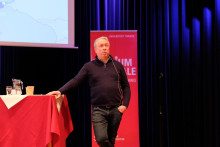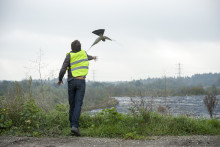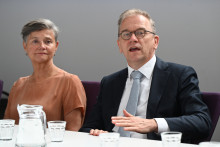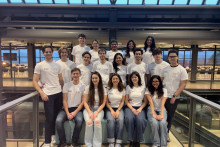Scheduled to graduate with a doctorate in Computer Science in September, Dimitrova describes herself on her own website as ‘extremely stubborn’ and ‘soooooo curious’. No doubt both those traits helped her to perserver in her research dedicated to mobile technologies. ‘One of the technical challenges to providing internet services at comparable speed on mobile phones is that there are many users trying to access a single ether network. By scheduling users, we attempt to organize and serve their demands. I started out creating probabilistic models to find a faster way to test scheduling.’
Dimitrova explains this in her Zilverling office in the Faculty of Electrical Engineering, Mathematics and Computer Science which she shares with three colleagues who come from the Netherlands, Italy, and China. A huge poster of Shrek 2 hangs on one wall and Dimitrova admits it is hers. ‘I love movies dedicated to the human character and the entire human dimension. I also love fantasy and fairy tales and have a big collection at home.’
Returning to her studies, she says, ‘While improved scheduling can help operators optimize their networks, distances still pose problems. This brought me to my research on the possibility of using intermediate stations to resend signals.’
Together with her promoter and industry professor Hans van den Berg, Dimitrova created new research approaches and scheduling schemes for the most advanced mobile network (UMTS HSPA). But Dimitrova isn’t stopping there. She is now evaluating her applications to see if they can also apply to the newest and most promising candidate in the evolution of cellular networks — the LTE technology.
To balance her technical side, Dimitrova dedicates her free time to oil painting, photography and gardening. ‘It’s something I do to make me happy,’ she says smiling. She has studied at the UT since 2004, but is now looking for a post doctoral position in England or Spain. ‘I like the Netherlands because you can always have your own opinion, things are well-organized, and people obey the law. But people seem to be more reserved. It takes a lot of time to make Dutch friends at a deeper level, as opposed to Italians or South Americans.’
Dimitrova was born in Plovdiv, Bulgaria, an ancient city that even has traces of a Neolithic settlement dating to roughly 4000 BC. Even though she has moved seven times, she still calls it home. ‘We have a saying in my country, “I love the motherland. I hate the country.” Bulgaria is beautiful with seas, lakes, mountains, meadows, and a more relaxed mentality. But it is sad. There are no opportunities there for you to perform at your highest professional level. Half of my friends have left to study or work abroad. And the ones who stayed are considering leaving.’
Dimitrova’s highest professional level includes her 2009 award by the International Conference on Next Generation Mobile Applications, Services and Technologies (ICUMT) for ‘Best Paper’. Her paper ‘Performance of relay-enabled uplink in cellular networks—a flow level analysis’ was co-authored with Van den Berg and Geert Heijenk. ‘I want to thank all my colleagues,’ she says while showing me the shiny gold plaque. ‘But most especially the colleagues with whom I share this office. We come from four different countries, but somehow found a really nice balance to work together.’
 |
| Dimitrova evaluates mobile networks. On both wrists she wears ‘martenitsi,’ red-and-white threaded bracelets that are given in Bulgaria for Baba Marta (Grandmother March) the first day of spring celebrated on March 1. The red symbolizes health and the white success. (Photo: Gijs van Ouwerkerk) |







